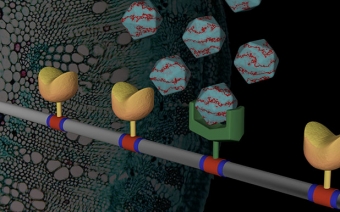
The United States Department of Energy Office of Science published a highlight of Professor Michelle O'Malley's scientific research, How Fungal Enzymes Break Down Plant Cell Walls. Professor O'Malley was the Principal Investigator on the research.
The research focuses on how Lignocellulose-degrading enzyme complexes could improve biofuel production, the findings highlight the power of fungal enzymes in breaking down lignocellulose. These enzymes could be harnessed to develop novel strategies for efficient biofuel production.
 The work of the O’Malley group analyzes the function of anaerobic gut fungi and the potential benefits to bio-based pharmaceuticals and less expensive biofuels. Presently, biofuel is developed primarily from food crops that leads to increased competition for crops grown for fuel or food, which could be alleviated with a resourceful process for ethanol to be converted from sugars.
The work of the O’Malley group analyzes the function of anaerobic gut fungi and the potential benefits to bio-based pharmaceuticals and less expensive biofuels. Presently, biofuel is developed primarily from food crops that leads to increased competition for crops grown for fuel or food, which could be alleviated with a resourceful process for ethanol to be converted from sugars.
Current research in The O'Malley Lab includes analysis of innovative enzymes from anaerobic gut fungi, metabolic engineering for enhanced anaerobic cooperation, engineering of synthetic cellulose-degrading complexes (cellulosomes) for consolidated bioprocessing, and deciphering the structurefunction relationship of membrane proteins within microbes.
This year, Professor O’Malley has received the ACS Polymeric Materials: Science and Engineering Young Investigator Award in April, was named a Scholar by the Henry & Camille Dreyfus Foundation, in July, recognizing outstanding young faculty in the chemical sciences who have demonstrated excellence in research and a commitment to furthering education in the chemical sciences, and was the recipient of a Rising Star Award from the American Chemical Society in October.
Professor O’Malley has also been honored with the 2016 Presidential Early Career Award for Scientists and Engineers, 2015 National Science Foundation CAREER Award, 2015 Cottage Health - UCSB Special Research Award, 2015 MIT Technology Review Top 35 Innovators Under 35, 2014 TechConnect Innovation Award, and 2013 U.S. Department of Energy Early Career Award.
O’Malley is an inventor of 4 patents/patent applications, including “Methods and Compositions for Redesigning Secreted Proteases for Therapeutic Use,” “Bioproduction of Methyl Methacrylate,” “Production of Biofuels from Novel Fungal Strains and Enzymes Derived Therefrom,” and “Novel Polyketide Synthase Domains from Fungal Organisms.”
She is also the author of over 30 scientific publications, with manuscripts published in Science, Nature Microbiology, and Nature Genetics, as well as, Metabolic Engineering, Frontiers in Microbiology, BMC Genomics, ACS-Chemical Biology, Anaerobe, Bioengineered, WIRES, and Biotechnology and Bioengineering.
And, in mid-July, the O'Malley Lab joined with the Joint BioEnergy Institute, a Department of Energy Bioenergy Research Center, to develop new bio-based products and paths towards renewable energy.
Professor O’Malley graduated from Carnegie Mellon University, with a BS in both Chemical Engineering and Biomedical Engineering, and a PhD from the University of Delaware in Chemical Engineering, followed by a USDA-NIFA Postdoctoral Fellowship at MIT in the Department of Biology Broad Institute.



